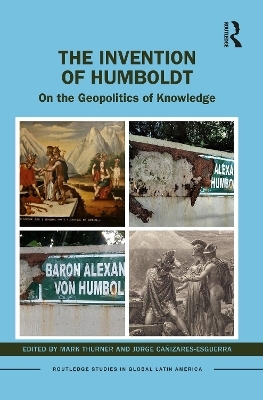
The Invention of Humboldt
Routledge (Verlag)
978-1-032-13916-6 (ISBN)
Rather than ‘follow in Humboldt’s footsteps,’ this book outlines the new critical horizon of post-Humboldtian Humboldt studies: the archaeology of all that lies buried under the Baron’s epistemological footprint. Contrary to the popular image of Humboldt as a solitary ‘adventurer’ and ‘hero of science’ surrounded by New World nature, The Invention of Humboldt demonstrates that the Baron’s opus and practice was largely derivative of the knowledge communities and archives of the Hispanic world. Although Humboldtian writing has invented a powerful cult that has served to erase the sources of his knowledge and practice, in truth Humboldt did not ‘invent nature,’ nor did he pioneer global science: he was the beneficiary of Iberian natural science and globalization. Nor was Humboldt a pioneering, ‘postcolonial’ cultural relativist. Instead, his anthropological views of the Americas were Orientalist and historicist and, in most ways, were less enlightened than those of his Creole contemporaries.
This book will reshape the landscape of Humboldt scholarship. It is essential reading for all those interested in Alexander von Humboldt, the Hispanic American enlightenment, and the global history of science and knowledge.
Mark Thurner is Distinguished Professor of Anthropology, History and Humanities at FLACSO-Ecuador, and Emeritus Professor of History at the University of Florida. He was Professor of Latin American Studies at the Institute of Latin American Studies, University of London, until the Institute's forced closure in 2021. He is the author of History’s Peru: The Poetics of Colonial and Postcolonial Historiography (2011) amongst numerous other publications. He is the editor of The First Wave of Decolonization (Routledge, 2019). Jorge Cañizares-Esguerra is the Alice Drysdale Sheffield Professor of History in the Department of History, University of Texas at Austin. He is the author of Nature, Empire, and Nation: Explorations of the History of Science in the Iberian World (2006) amongst numerous other publications. He is editor of Entangled Empires: The Anglo-Iberian Atlantic, 1500–1830 (2018).
1. The Apotheosis of Humboldt during the Nineteenth Century
Leoncio López-Ocón
2. A Sense of Place: Early Modern Roots of Humboldt’s Natural History Practices
Florike Egmond
3. Six Days on Tenerife: The Making of Humboldt’s Tropical Antique
Peter Mason
4. Caldas and Humboldt in the Andes: Who Invented Biogeography?
Alberto Gómez Gutiérrez
5. An Archaeology of Mutis’ Disappearing Gift to Humboldt
José Antonio Amaya
6. Incas, Pyramids, and Amazons: Notes on Humboldt’s Equatorial Encounters
Neil Safier
7. Humboldt’s Magic Mountain
Juan Pimentel
8. Peruvian Desencuentro: Humboldt’s Fog, Unanue’s Light
Mark Thurner
9. Air in a Flask: The Mexican Making of Humboldt’s Objects of Knowledge
Miruna Achim and Gabriela Goldin Marcovich
10. Humboldt’s Misreading of the Mercantilist Face of New Spain
José Enrique Covarrubias
11. Bonpland’s Cactus, Or Trafficking in Exotics and Ignorance
Irina Podgorny
12. Humboldt’s Columbus, Or the Iberian Worlds that Humboldt Ignored
Jorge Cañizares-Esguerra
| Erscheinungsdatum | 12.12.2022 |
|---|---|
| Reihe/Serie | Routledge Studies in Global Latin America |
| Zusatzinfo | 3 Tables, black and white; 51 Halftones, black and white; 51 Illustrations, black and white |
| Verlagsort | London |
| Sprache | englisch |
| Maße | 156 x 234 mm |
| Gewicht | 580 g |
| Themenwelt | Geschichte ► Allgemeine Geschichte ► Neuzeit (bis 1918) |
| Geisteswissenschaften ► Geschichte ► Regional- / Ländergeschichte | |
| ISBN-10 | 1-032-13916-1 / 1032139161 |
| ISBN-13 | 978-1-032-13916-6 / 9781032139166 |
| Zustand | Neuware |
| Haben Sie eine Frage zum Produkt? |
aus dem Bereich


